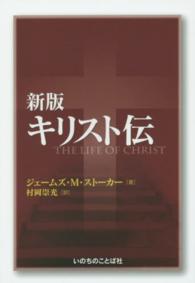- ホーム
- > 洋書
- > 英文書
- > Politics / International Relations
Full Description
This book analyzes Chinese politics, particularly the rule of Chinese Communist Party (CCP) leaders from Mao Zedong to Xi Jinping, through an examination of the country's political ideology.
This book succinctly covers the DNA of Chinese politics through the philosophies of sages in China's first liberalization period during the Warring States epoch, principally those of Confucius, Mencius, Lao Zi, Zhuang Zi, Shang Yang and Han Fei. With an appreciation of these traditional ideologies, this book displays how Chinese political philosophy (which incorporates elements of Confucianist and especially Legalist thinking) has influenced ideas and policies from as early as the Qin and Han dynasties through to the Qing dynasty and even to the current day. Highlighting the controversies revolving around the flowering and contention of beliefs and isms during China's second liberalization in the Republican Period (1912-1949), this book reveals how and why this led to the repression of the CCP era under dictators ranging from Mao Zedong to Xi Jinping.
Revealing how Chinese political and philosophical legacies impact the development of ideology and policies of CCP leadership, this book will be a valuable resource to students and scholars of Chinese politics, Chinese history, and international relations.
Contents
1. The legacy of Liberalization in the Warring States Era 2. Dynastic China and the Nurturing of the Chinese DNA 3. The curse of the "dynastic cycle" and the Chinese DNA 4. How Thought Liberation in the Republican Period led to Communist Rule 5. How the Dynastic DNA underpins the policies of Mao and Xi 6. China into the late 2020's: The Future in light of the Past








